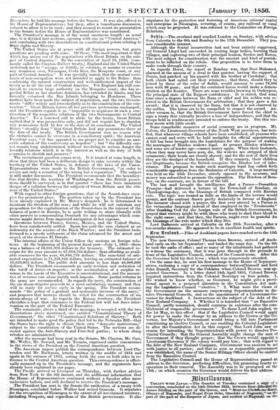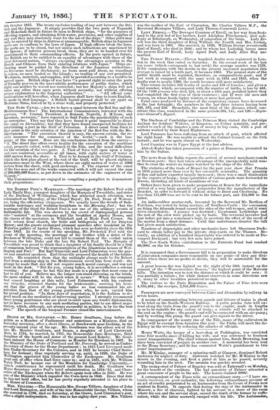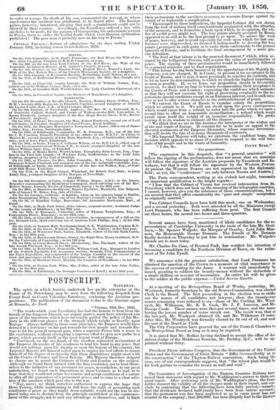3115rrl1uarna5.
MERIT -wnstr jerare.-The Gazette of Tuesday contained a dopy of a convention, concluded on the 14th October 1854, between Rear-Adnitted Si? James Stirling on the part of the Queen, and -" Mezi-no Chekfu-no Komi Obnnyo of Nagasaki, and Nagai Evan Oche, Omedski of Nagasaki," on the part of the part of the Emperor of Japan, and ratified at Nagasaki on tie 9th October 1865. The treaty excludes trading of any sort between the Bri- tish and the Japanese. It simply provides that the two ports of Nagasaki and Hakodadi shall in future be open to British ships, "for the purposes of effecting repairs, and obtaining fresh water, provisions, and other supplies of any sort they may absolutely want for the use of the ships." Other ports may wly be entered by ships in distress or unmanageable. British ahips in Japanese po is are to conform to the laws of Japan. If high officers break the laws, e ports are to be closed, but not unless such infractions are sanctioned by the Queen; if inferior persons break them, they are to be handed over for punishment to their commanding-officers. In the ports opened in future, the British are to be entitled to an equality of advantages with those of the most favoured nation" always excepting the advantages accruing to the Dutch and Chinese from their existing relations with Japan." Ships an- choring must be guided by the directions of the Japanese authorities; no fire-arms must be discharged ; no boats must pull about, no soundings be taken, no men landed on the islands ; no trading of any sort permitted. Workmen, materials, and supplies, will be provided according to a tariffto be agreed upon. British ships of war have "a general right to enter the ports of friendly powers in the unavoidable performance of public duties, which right can neither be waved nor restricted ; but her Majesty's ships ;rill not enter any other than open ports without necessity, nor without offering proper explanation to the Imperial authorities." . . . . "All official com- munications will hereafter, when Japanese shall have time to learn English, be made in that language. A British burial-ground shall be set apart on Medsume Sima, fenced in by a stone wall, and properly protected."
THE SUEZ CANAL.—Are we to have a canal between the Red Sea and the Mediterranean Sea ? The International Commissioners intrusted with the surveys, "F. Conrad, President, A. Renaud, Negrelli, J. M`Lean and Lieusson, secretary," have reported to Said Pasha the practicability o such an enterprise. They say that they have found it quite impossible to direct the canal on Alexandria ; but that they have found unexpected facilities for establishing a port in the Gulf of Pelusium. A direct canal from Suez to that point is the only solution of the junction of the Red Sea with the Me- diterranean. " The execution thereof is easy, the success certain, the re- sults immense for the commerce of the world,"--such is the lan- guage of the report. Here are the conclusions derived from the survey- " 2. The direct line offers every facility for the execution of the maritime canal, properly called, with a branch to the Nile, and the usual difficulties for 'the creation of the two ports. 3. That of Suez will open upon a large and sure roadstead, accessible at all times, with eight metres of water at 1600 metres -from the shore. 4. That to be formed in the Gulf of Pelusium, which the first plan placed at the end of the Gulf, will be placed eighteen kilometres more to the West, where there are eight metres of water at 2300 metres from the shore, with good anchorage. 5. The expense of the canal of the two seas and of the works connected with it will not exceed the sum of 200,000,000 francs, as put down in the estimates of the engineers of the Viceroy."
The Commissioners are engaged in compiling a pamphlet to demonstrate their propositions.
Sm. ROBERT PEEL'S MAHRIAGE.—The marriage of Sir Robert Peel with Lady Emily Hay, youngest daughter of the Marquis of Tweeddale, and sister of the Duchess of Wellington, which has attracted much attention, was solemnized on Thursday, at -the Chapel Royal; Dr. Peel, Dean of Worces- ter, being the officiating clergyman. We usually leave the details of fash- ionable 'marriages and wedding-breakfasts to the Horning Post; but the marriage of the third Sir Robert Peel is not one of. the ordi722 events of fashionable life. This was shown by the crowd of distinguished persons who " assisted " at the ceremony and the breakfast at Aps y House, and the cheers of the spectators in Whitehall and at Hyde Park Corner. On their return from church, the bride and bridegroom set off for Drayton Manor; and the guests exchanged pleasant speeches after breakfast in the Waterloo gallery of Apsley House, which has seen no festivity since the 18th June 1852. In the course of the speaking, Mr. Frederick Peel said the event of the morning, the marriage of his brother with a sister of the Duchess of Wellington, could not fall to remind them of the cordial union between the late Duke and the late Sir Robert Peel. The Marquis of Tweeddale was proud to think that a daughter of his family should be a link of connexion between l'-the rePresentatives of the illustrious houses of Wel- lington and PeeL" But Earl Granville and Lord Palmerston were the gay- est and smartest speakers. Earl Granville proposed the health of the brides- maids. He reminded them that the midnight plunge made by Sir Robert Peel from a sinking ship in the Mediterranean saved him from death : the plunge he made that day did not require much moral courage, and was not made in the dark. " But for you, young ladies, it is nevertheless a solemn warning : the plunge he has this day made is a plunge that must come at last to all of you. Believe me, the longer you -stand shivering on the brink, the more violent will be the shock when at occurs." When the company had ceased laughing at this sally, Lord Palmerston, with his custom- ary vivacity, returned thanks for the bridesmaids ; assuring his hear- ers that the graces of the young ladies no less commanded his ad- miration than that of the young gentlemen who, he saw, envied him 'his proud position. "In these days of negotiation, it is the fashion to de- Pend much on the mediation of intervening -parties. I strongly recommend those young gentleman who are about to enter upon any tender diplomacies,
n ot to have recourse to any such mediating parties, but to use direct nego- tation, which, although, not always successful in polities, is by far the beet Plan." The speech of the buoyant Premier closed the entertainment.
DEATH or Ma. GOULBURN. — Mr. Henry Goulburn, long before the public as a Member of Parliament and sometimes as a Minister, died on
S aturday morning, after a short illness, at Beechworth near Dorking, in the seventy-seeond year of his age. Mr. Goulbourn was the eldest son of the late Mr. Manbee Goulburn, and Susan, a daughter of Lord Chet
Born in 1784, he married, in 1811, the Honourable Jane Montague, third daughter of the fourth and sister of the present Lord Rokeby. Mr. Goul- burn- entered the House of Commons as Member for Horsham in 1807. In the Ministry of the Duke of Portland and Mr. Perceval, he served as Under- Secretary of State for the Home Department -p in 1812 Lord Liverpool made himUnder-Secrotary for the Colonies, and in 1821 he became Cluef Secre- tary for Ireland ; thus regularly serving up, until, in 1828, the Duke of Wellington appointed him Chancellor of the Exchequer. Mr_ Goulburn went out of office when Earl. Grey came in ; and in 1831, with Mr. William rates Peel, he became one of the Members for Cambridge University,— which constituency he represented until his death. Mr. Goulburn was Home Secretary under Peel's brief administration in 1834-'35, and Chan- eellor-of the -Exchequer when Sir Robert again took office in 1841. He was sane of the Ministry which repealed the Corn-laws in 1846. Since that date Ile has not held office, but he has pretty regularly attended in his place in the House of Commons.
„ MBE. VIIXTERS.—The Hononrahle Mrs. George Villiers, daughter of John mat Lord Boringtion, and wife of the late Honourable George Villiers, whom she married in 1798, died on Saturday, at the Crrove, Lord Clarendon's seat, after a slight indisposition. She was in her eightysfirst year. Mrs Villiers
was the mother of the Earl of Clarendon, Mr. Charles Villiers M.P., the Reverend Montague Villiers, and Lady Theresa Cornwall Lewis.
LADY Ennora..—The Dowager Countess of Erroll, on her way from Soot. land to the sick bed of her brother, Lord Adolphus Fitzclarenee, died sud- denly at Edinburgh, on Wednesday, of congestion of the brain. Lady Er- roll was the third daughter of King William the Fourth and Mrs. Jordan, and was born in 1801. She married, in 1820, William George seventeenth Earl of Erroll, who died in 1846 ; and by whom her Ladyship leaves issue the present Earl of Erroll, Lady Agnes Duff, and Lady Alice Hay un- married.
THE Pestle Hastan.—Eleven hundred deaths were registered in Lon- don in the week that ended on Saturday. In the second week of the last ten years (which corresponds to last week) the average number was 1239. If for comparison with the deaths in the present increased population this average is raised by a tenth part, it becomes 1363. The present state of the public health must be regarded, therefore, as comparative) ygood; and if last week is compared with the same week in 1854 and 1866, when the deaths rose to nearly 1500 the result becomes still more satisfactory.
This return includes 542 deaths of males and 5,58 of females ; and gives a total nnmber, which, as compared with the number of births, is less by 463. Of the 1100 persons who died, 224, or about a fifth part, perished before they had completed the first year of their existence ; and 47 were old men and women, on whose heads eighty winters or more had gathered.
Fatal cases produced by diseases of the respiratory organs have decreased in the last fortnight ; the numbers in the last three returns having been 348, 253, and 238. Bronchitis, the most fatal of the diseases which con- stitute this class, numbered in the same periods 204, 141, and 126.—Regis- trar-Generars Report.
The Duchess of Cambridge and the Princess Mary visited the Cambridge Asylum for Soldiers' Widows, at Kingston, on Friday sennight, and pre- sented to each of the inmates a sum of money to buy coals, with a pair of mittens worked by their Royal Highnesses.
Lord Panmure has been suffering from an attack of gout, which affected his right hand. He was unable to attend the Cabinet Council on the 11th instant; and he was again absent on Wednesday.
Lord Canning was in Upper Egypt at the last advices.
Abd-el-Kader has taken possession of a palace at Damascus, presented to him by the Sultan.
The news from the Baltic reports the arrival of several merchant-vessels at Russian ports : they had taken advantage of the unexpectedly mild wea- ther to cross the waters no longer watched by the ships of the Allies.
The statistics of the trade of Memel for the past year show that Prussia in 1855 gained more than ever by her ostensible neutrality. The quantity of flax and tallow exported largely increased ; there was a small diminution in the exports of hemp; large quantities of various goods were forwarded to Russia, including all kinds of munitions of war.
Orders have been given to make preparations at Rouen for the immediate arrival of a very large quantity of gunpowder from the manufactory of the Bouehet, in order to forward it without delay to Brest and Cherbourg. No less than 111,000 tons are to be sent to the former port, and 224,000 to the latter.
An india-rubber mortar-raft, invented by the Reverend Mr. Berthon of Fareham, was tested by firing mortars, off Southsea Castle : the concussion on firing the fifteenth round caused the sides of the raft toand it went down immediately. A gunner was drowned ; Lieutenant Lethbridge and the rest of the crew were picked up by boats. The reverend inventor had just before got into a waterman's boat, to ascertain the effect of the recoil of the mortar from a short distance. Until this unfortunaee disaster the raft had given much satisfaction.
Numbers of shipwrights and other mechanics have left Sheerness Dock- yard to obtain betterpay in the •private ship-yards on the Thames. Re- cently, an addition of pa hundred shipwrights was ordered to be made at De- vonport Dockyard ; but very few men have joined.
The New South Wales contribution to the Patriotic Fund had reached 60,0001. on the 1st October.
It is rumoured that a Government bill is in preparation to make directors of joint-stock companies more responsible on one point—if they pay divi- dends when there are no profits to divide, they will be answerable for tire amount.
A great beacon-fire was lighted on the night of the 10th instant on the summit of the " Worcestershire Beacon," the highest point of the Malvern hills. The intention was to test the distance at which it could be seen : it was partially a failure ; for while distant observers in some directions saw it, many in other localities perceived no sign.
The visitors to the Paris Exposition and the Palace of Fine Arta were 4,533,464; the receipts, 2,941,668 francs. • Passengers are now conveyed between Cairo and Alexandria by railway in seven hours.
A means of communicating between guards and drivers of trains is about to be tried on the South-Western Railway. A gutta pereha tube will ex- tend along the train from the guard's van to the engine, made in lengths so as to be suitable for any extent of train - a whistle ;rill be attached to the end on the ene ; the guard's end will be connected with an air-pump; and by working this pump the guard can give signals to the driver.
In consequence of the scanty rise of the Nile, many of the cultivators in Egypt will be exempt from taxation this year : the Pasha will meet the de- ficiency in the revenue by reducing the salaries of officials.
Henry Watts, the keeper of a beer-shop at Paddington, was convicted some four months since of killing his wife and was sentenced to fourteen years' transportation. The chief witness Tsgainst him, Sarah Browning, has since been convicted of perjury in another case. A memorial has been sent to the Home Secretary; and he has commuted Watts's punishment to two years' imprisonment.
Mr. M‘Kinlay, manager of a spinning-mill at Glasgow, dismissed Robert Anderson for neglect of duty. Anderson watched for Mr. 1A`Kinlay in the streets in the evening, and fired a pistol at him as he passed, severely wounding him in the neck. The assassin was quickly arrested.
The racing-stud of Palmer of Rug. eley was sold at Tattersall'a on Monday, for the benefit of the creditors. The bad notoriety of Palmer attracted a great concourse of people to the sale. The horses realized 39061.
A correspondent of the Times tells an extraordinary story.—" I have re- s'cently received, on good authority, the following extraordinary account of an act of cruelty perpetrated by an Ambassador from the Court of Persia now resident in Russia. It appears that during the stay of the Ambassador in Moscow, a fire of charcoal, lighted by his servant in a stove of the room where his son and the servant slept, caused the death of the former by suffo- ration, while the latter narrowly escaped with his life. The Ambassador,
•
in order to avenge the death of his son, commanded the servant to whose carelessness the accident was attributed, to be flayed alive. Tie Russian police, however, interfered, alleging that such a punishment could not be allowed in their country. Accordingly, his Excellency ordered a box with air-holes to be made, for the purpose of transporting his unfortunate' servant to Persia, there to suffer the fearful death which even Russian civilization prohibited ! The poor nuns is probably now on his way to Persia."
CRYSTAL PALACE.—Return of admissions for six days ending Friday January 18th, including season ticket-holders, 5076.
































 Previous page
Previous page